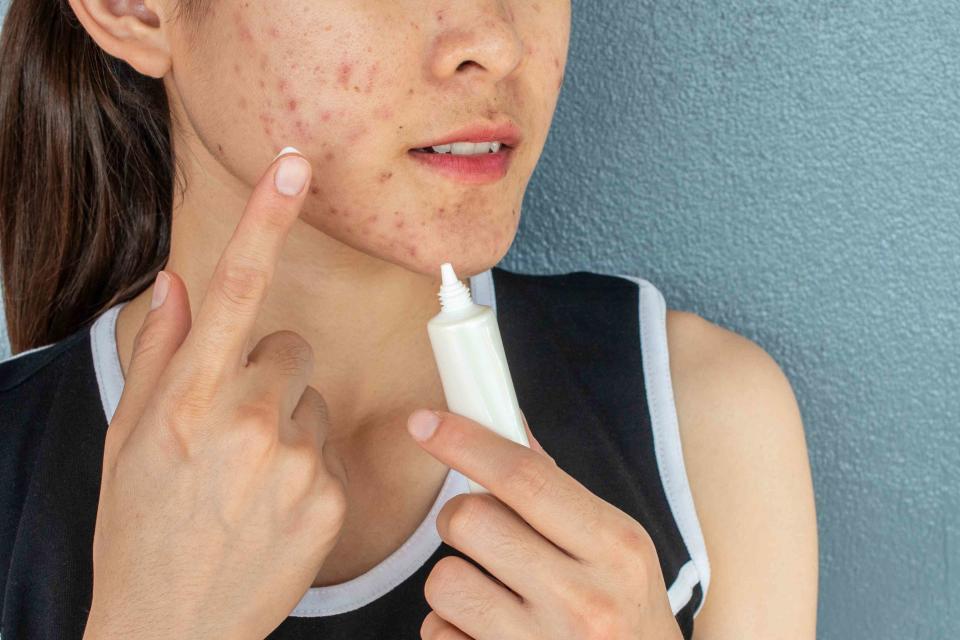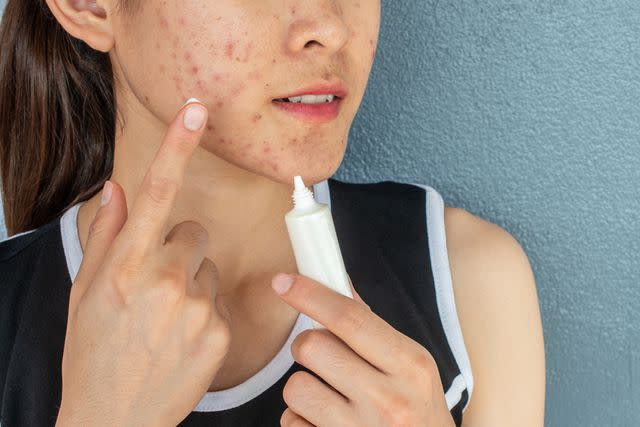Is Zinc Good for Acne? We Asked Dermatologists
What you need to know about the veteran skincare ingredient.

Boyloso/Getty Images
As anyone old enough to remember removing every drop of sebum from their skin with a harsh astringent can attest, acne treatments come and go. But one ingredient that has endured the test of time is zinc — probably because the essential mineral is thought to mitigate several components of acne at once.
“Acne is a chronic inflammatory disease, and the anti-inflammatory properties of zinc may help to soothe the skin,” says Nicole Hayre, MD, board-certified Dermatologist and founder of Cutocin and the Cosmetic Dermatology Center in McLean, VA. Zinc also has “antibacterial properties and can work to regulate sebum production,” says Marisa Garshick, MD, a dermatologist who practices in New York and New Jersey. This explains why it is not only found in blemish remedies, but in preventive treatments for those with oily skin.
However, although the ingredient has proven benefits, there are still some questions about which form of zinc — topical or oral — is best for treating acne.

Boyloso/Getty Images
How Topical Zinc Works to Treat Acne
“With topical use, zinc has been found to help decrease the redness and irritation caused by acne, exfoliate the skin that can clog pores, regulate the skin’s sebum production, and help kill the bacteria that can often cause acne,” says Mona Gohara, MD, a board-certified dermatologist with several practices in Connecticut.
Topical treatments can take many different forms, all of which can be applied directly to affected skin. Some ingredient names to look out for on your product labels include: zinc sulfate, zinc pidolate, zinc acetate, and zinc octoate. (We like La Roche-Posay Effaclar Gel Facial Wash, La Roche-Posay Effaclar Facial Wipes, and Dr. Dennis Gross Skincare DRx Blemish Solutions™ Clarifying Mask.)
Dr. Gohara also recommends mineral sunscreens with zinc for her patients who suffer from acne. “I always want to ensure that my patients are taking the adequate measures to protect their skin, and I often find that my patients who suffer from acne are the most reluctant to use sunscreen daily as they’re afraid it will clog their pores. Because of this, I love to recommend 100% mineral sunscreens that feature zinc oxide,” she says. (Two to try: EltaMD UV Restore Broad-Spectrum SPF 40 and EltaMD UV Sport Broad-Spectrum SPF 50.)
How a Zinc-Rich Diet Can Help Treat Acne
“Diet affects the skin,” Dr. Hayre says. “I urge my patients to try to stick to a low-glycemic, well-balanced diet as a high-glycemic diet is very inflammatory.” For most people, a balanced diet will provide sufficient zinc, Dr. Hayre says. But for those with severe acne whose diet tends to be more erratic, zinc supplements may be helpful, Dr. Hayre says. (Note: Foods that are high in zinc include beans, nuts, poultry, beef, dairy products, oysters, pumpkin seeds, and fortified cereals.)
However, too much zinc can cause problems, too. So it’s important to start supplements under the guidance of a physician as high zinc levels can lead to gastrointestinal upset, abdominal pain, diarrhea, nausea, vomiting and loss of appetite. Consult your doctor for the appropriate dosage.
Which Form of Zinc is Best for You?
The jury is still out on this question. One large study found that oral zinc was less powerful than minocycline, an antibiotic in the tetracycline family, which can be used to treat inflammatory acne. However, another study found that the efficacy of topical anti acne medications containing zinc acetate or octoate was equal to or superior to tetracycline.
But one thing the pros agree on is that for those who prefer natural remedies, zinc (in its topical or oral form) is worth a try.
“Because zinc is a nutrient your body needs and can often be found in one’s diet, it tends to spark the interest of those who gravitate towards ‘clean’ and ‘natural’ products,” Dr. Gohara says.
Both forms of zinc are also a good option for those looking to diversify their acne-fighting portfolio of products, since it works well in combination with other blemish busters.
“It can be effectively combined in a routine with other acne-fighting ingredients like benzoyl peroxide, salicylic acid and retinoids,” Dr. Garshick says.
For more Real Simple news, make sure to sign up for our newsletter!
Read the original article on Real Simple.

